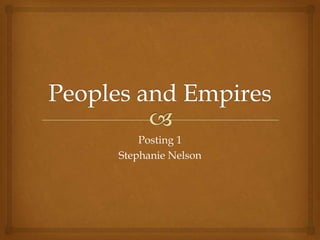Recommended
Recommended
More Related Content
What's hot
What's hot (20)
Viewers also liked
Viewers also liked (18)
تقرير عن حالات القتل خارج إطار القانون بحق طلاب الجامعات والمعاهد المصرية - م...

تقرير عن حالات القتل خارج إطار القانون بحق طلاب الجامعات والمعاهد المصرية - م...
You may be very busy at work, but are you productive

You may be very busy at work, but are you productive
Similar to Peoples and empires p1
Similar to Peoples and empires p1 (14)
In my last lecture, I discussed the development of Greek civilizat

In my last lecture, I discussed the development of Greek civilizat
Did Philip IIs conquest of Greece result more from the strength of.pdf

Did Philip IIs conquest of Greece result more from the strength of.pdf
More from Stephanie Nelson
More from Stephanie Nelson (6)
Peoples and empires p1
- 1. Peoples and Empires Posting 1 Stephanie Nelson
- 2. Alexander the Great Alexander III of Macedon (356-323) was born on July 20th, in Pella. He was the son of Philip II, the King of the Ancient Greek Kingdom of Macedon Philip had paid Aristotle to teach his son about Greek culture and costumes, since Philip had always known that his son was going to conquer Greece. His personality consisted of a violent temper and impulsive nature, caused by his weakness to alcohol. This behavioral trait contributed to some of his decisions in life.
- 3. Alexander the Great Created his empire, with the help of father Philip II, by the age of 30 Is known for his vast conquests, but also the cultural diffusion that his conquests engendered. He had a great desire for knowledge, a love for philosophy, and was an avid reader. Alexander showed signs of megalomania and paranoia in his later years of life.
- 4. The Roman Empire 60 BCE-160 CE Most of the empire of Alexander the Great had fallen into Roman hands by the first century BC. The Romans’ greatest contribution to the world culture was a body of law suitable for governing world state. The Roman made very few contributions to scientific knowledge but they were skillful in applying their knowledge of science to practical use as evidenced in their excellent roads, bridges, aqueducts, stadiums, coliseums and massive public buildings. Christianity began to spread over the Roman Empire. To the Romans, religion was less a spiritual experience than a contractual relationship between mankind and the forces which were believed to control people's existence and well-being.

